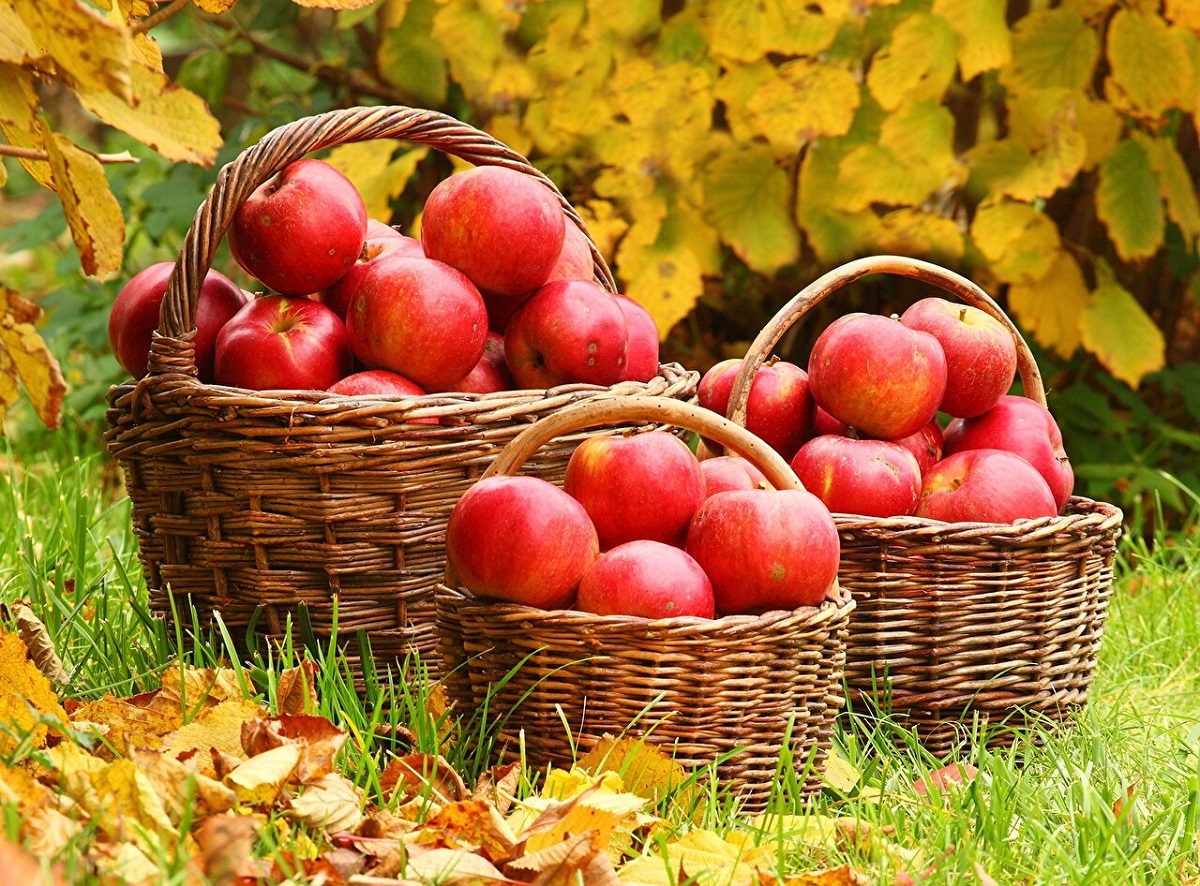6 Top Autumn Fruits: A Seasonal Delight Packed With Health Benefits

Autumn Fruits: Autumn is a season known for its vibrant colors, cooler temperatures, and the harvest of an array of delicious fruits.
Autumn Fruits, As the leaves change color and the air turns crisp, nature provides a bounty of fruits that are not only flavorful but also packed with essential nutrients. From apples to pumpkins, autumn fruits offer a variety of health benefits that can boost immunity, improve digestion, and provide essential vitamins and minerals. This content explores the nutritional value and health benefits of popular autumn fruits, highlighting why they should be a staple in every diet during the cooler months.
6 Top Autumn Fruits
1. Apples: A Nutrient Powerhouse

Autumn Fruits, Apples are arguably one of the most iconic autumn fruits. With their crisp texture and sweet-tart flavor, they are a versatile fruit that can be enjoyed fresh, baked, or even pressed into cider. Beyond their delicious taste, apples are packed with nutrients that offer numerous health benefits.
Rich In Fiber: Apples are an excellent source of dietary fiber, particularly in the form of soluble fiber called pectin. Pectin helps to lower cholesterol levels, improve digestion, and promote gut health by feeding beneficial bacteria in the intestines.
Antioxidant Power: Apples are loaded with antioxidants, particularly flavonoids like quercetin, which help fight inflammation and reduce the risk of chronic diseases such as heart disease and cancer. Additionally, the vitamin C content in apples supports the immune system, helping to ward off autumn colds and flu.
Weight Management: Apples are low in calories and high in fiber, making them an ideal snack for those looking to manage their weight. Eating apples can promote a feeling of fullness, reducing the urge to overeat.
2. Pears: A Sweet And Juicy Treat
Autumn Fruits, Pears, another autumn staple, offer a mild sweetness and juicy texture that make them a favorite in salads, desserts, or as a simple snack. Like apples, pears are rich in nutrients that support overall health.
High In Fiber: Pears are particularly high in dietary fiber, with one medium pear providing about 6 grams of fiber, or roughly 24% of the daily recommended intake. This makes pears an excellent choice for improving digestive health and preventing constipation.
Low Glycemic Index: Pears have a low glycemic index, meaning they cause a slower, more gradual rise in blood sugar levels. This makes them a suitable fruit for individuals with diabetes or those looking to maintain stable energy levels throughout the day.
Vitamin C And Potassium: Pears are a good source of vitamin C, which supports the immune system and skin health, as well as potassium, an essential mineral that helps regulate blood pressure and maintain heart health.
3. Pumpkins: The Star of Autumn

Autumn Fruits, While pumpkins are often associated with Halloween and fall decorations, they are also a highly nutritious fruit that offers a range of health benefits. Pumpkins are a type of winter squash and are incredibly versatile, being used in soups, pies, and even beverages like pumpkin spice lattes.
Rich In Beta-Carotene: The bright orange color of pumpkins is due to their high content of beta-carotene, a powerful antioxidant that the body converts into vitamin A. Vitamin A is essential for maintaining healthy vision, supporting the immune system, and promoting skin health.
Low In Calories: Despite being filling, pumpkins are low in calories, making them an excellent option for those looking to manage their weight. A cup of cooked pumpkin contains only about 50 calories but is rich in fiber, which aids digestion and promotes satiety.
Heart Health: Pumpkins are a good source of potassium, which helps regulate blood pressure. Combined with the fiber content, pumpkins contribute to heart health by lowering cholesterol levels and improving blood circulation.
4. Pomegranates: A Nutritional Gem
Autumn Fruits, Pomegranates, with their jewel-like seeds, are another autumn fruit that offers a wealth of health benefits. Known for their vibrant red color and tart flavor, pomegranates are packed with antioxidants and nutrients that support overall health.
High In Antioxidants: Pomegranates are one of the richest sources of antioxidants, particularly polyphenols like punicalagins. These antioxidants help protect the body from oxidative stress, reducing inflammation and lowering the risk of chronic diseases such as heart disease, cancer, and Alzheimer’s disease.
Anti-Inflammatory Properties: Studies have shown that the antioxidants in pomegranates can help reduce inflammation, which is linked to many chronic conditions. Regular consumption of pomegranates may help alleviate symptoms of arthritis and other inflammatory diseases.
Improves Heart Health: Pomegranate juice has been found to improve heart health by lowering blood pressure, reducing cholesterol levels, and improving blood flow. The fruit’s high fiber content also helps regulate blood sugar levels, making it beneficial for individuals with diabetes.
5. Grapes: A Small Fruit With Big Benefits

Autumn Fruits, Grapes, particularly red and black varieties, are harvested during the autumn season and are a delicious and nutritious addition to any diet. Whether enjoyed fresh, dried as raisins, or pressed into juice, grapes offer numerous health benefits.
Resveratrol For Heart Health: Grapes, especially red grapes, contain a powerful antioxidant called resveratrol, which has been linked to improved heart health. Resveratrol helps protect the blood vessels, lowers bad cholesterol (LDL), and reduces the risk of blood clots.
Rich In Vitamin K: Grapes are a good source of vitamin K, which is essential for blood clotting and bone health. Adequate vitamin K intake helps prevent osteoporosis and supports the healing of wounds.
Hydration And Skin Health: Grapes have a high water content, making them a hydrating fruit that helps maintain healthy skin. Their antioxidants also protect the skin from UV damage and premature aging.
6. Figs: A Fiber-Rich Delicacy
Autumn Fruits, Figs, often enjoyed dried or fresh in the autumn, are a nutrient-dense fruit with a unique sweet flavor and chewy texture. They are an excellent source of fiber, vitamins, and minerals that support overall health.
High In Dietary Fiber: Figs are rich in both soluble and insoluble fiber, which aids digestion, prevents constipation, and promotes a healthy gut microbiome. The fiber content also helps regulate blood sugar levels and supports weight management.
Bone Health: Figs are a good source of calcium, magnesium, and potassium, all of which are essential for maintaining strong and healthy bones. Regular consumption of figs can help reduce the risk of osteoporosis, especially in postmenopausal women.
Rich In Antioxidants: Figs contain polyphenols, which are antioxidants that protect the body from free radicals and reduce inflammation. This antioxidant capacity makes figs beneficial for heart health and reducing the risk of chronic diseases.
Conclusion
Autumn Fruits, Autumn brings with it a variety of fruits that not only provide delicious flavors but also offer numerous health benefits. From apples and pears to pumpkins and pomegranates, these seasonal fruits are rich in essential nutrients such as fiber, antioxidants, vitamins, and minerals.
Autumn Fruits, Incorporating autumn fruits into your diet can improve digestion, boost the immune system, promote heart health, and help maintain overall well-being. As the weather cools down, embracing the nutritional power of these fruits can help you stay healthy and energized throughout the season.
Also Read:
Fall Nutrition: Embracing Seasonal Foods For Optimal Health
Staying Healthy In Autumn: A Comprehensive Guide
Best 5 Herbal Remedies For Autumn: Boosting Immunity Naturally
Boosting Immunity For Autumn: Preparing Your Body For Cold And Flu Season




